Mushrooms
Mushrooms are fungi, which are not technically fruits or vegetables. In fact, fungi have more in common with animals than plants, and therefore belong to the same super-kingdom as animals, known as Opisthokonta.
In ancient Egypt, mushrooms are regarded as “plants of immortality.” Pharaohs loved their flavor so much that they decreed that only royals can consume mushrooms. Besides its delicious flavor, other cultures value the nutritional value of mushrooms. In Japan and China, mushrooms have been used as natural medicine for more than 2,000 years.
Mushrooms come in all kinds of shapes, sizes, colors, and flavors with more than 14,000 species spanning the globe! Uniquely nutritious, mushrooms are rich in potassium, vitamin B-complex, copper, riboflavin, niacin, and pantothenic acid. One portabella mushroom actually contains more potassium than a banana. It also contains significant amounts of selenium, more than in any other fresh produce.
Mushrooms not only act as our food source, they also help recycle plants after they die and transform them into rich soil. A truly environmentally friendly agent!
References:
http://www.mushroomshack.com/all-about-mushrooms/mushroom-basics/history-mushrooms
http://www.fungi.com/blog/items/facts-about-mushrooms.html
http://www.ars.usda.gov/is/kids/farm/story4/mushroomfacts.htm


